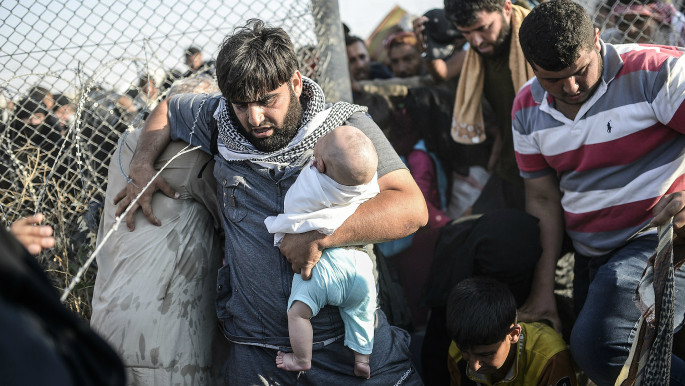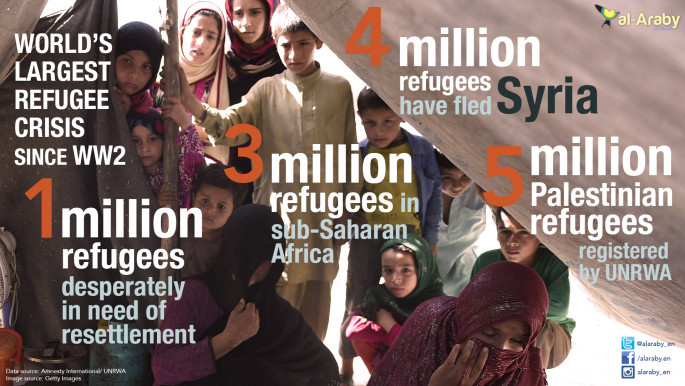World leaders 'abandoned millions of refugees'
"We are witnessing the worst refugee crisis of our era, with millions of women, men and children struggling to survive amidst brutal wars, networks of people traffickers and governments who pursue selfish political interests instead of showing basic human compassion," Amnesty International’s Secretary General, Salil Shetty said.
The report by the London-based group, entitled Global Refugee Crisis: A conspiracy of neglect, was launched in Beirut on Monday ahead of World Refugee Day on June 20.
It explores the startling suffering of millions of refugees, including those from Syria, Somalia, Sudan, Eritrea and Ethiopia to those risking their lives attempting to cross the Mediterranean Sea to Europe, as well as a large number of Rohingyas stranded on boats in South East Asia, as they flee state-sponsored persecution in Myanmar.
The rights group has called for a radical change in the way the world deals with refugees.
"The current refugee crisis will not be solved unless the international community recognises that it is a global problem that requires states to significantly step up international cooperation," Shetty added.
 |
Millions are struggling to survive amidst brutal wars and governments who pursue selfish political interests |  |
 |
|
| Syrians pass through border fences to enter Turkish territory illegally [AFP] |
Syria: World’s largest refugee crisis
Syria has the second-largest refugee population in the world after the Palestinians and is now the world's largest refugee crisis.
There are around 12.2 million people in need of humanitarian aid, which is about half of Syria's total population.
However, the international community has "failed to provide them, or the humanitarian agencies supporting refugees, with sufficient resources" the report revealed.
95 percent of Syrian refugees are in just five main host countries: Turkey, Lebanon, Jordan, Iraq and Egypt, which Amnesty said are "struggling to cope."
Thousands more Syrian refugees, including young children, poured into Turkey on Sunday to escape the battle between Kurds and the Islamic State (IS) group for the Syrian town of Tal Abyad.
Some have crossed the border illegally through holes in fences, prompting rapid intervention from the Turkish army.
Turkey has so far taken in 1.8 million Syrian refugees since the conflict in Syria erupted in 2011.
But Amnesty warned that these countries were being overwhelmed by "such huge burdens".
"No country should be left to deal with a massive humanitarian emergency with so little help from others, just because it happens to share a border with a country in conflict," said Shetty.
The situation is so desperate that some of Syria’s neighbours, such as Lebanon, have resorted to deeply troubling measures, including denying desperate people entry to their territory and pushing people back into the conflict.
Mediterranean: The most dangerous sea route
This year alone, around 100,000 refugees have attempted to cross the Mediterranean Sea into Europe - 1,865 people have died in the process so far.
Paying thousands of dollars each and risking their lives to escape war, poverty and brutality in their own countries, some survivors have reported violence and abuse by people traffickers.
More than 8,000 Syrians make up for the largest migrant group, followed by Eritrea and Somalia, as well as many others from sub-Saharan Africans.
Amnesty believes that without sufficient safe and legal alternative routes for refugees and migrants – people will continue to risk their lives.
Amnesty welcomed measures taken by European Union members to strengthen the Triton border security operation, but called for further action, notably by creating more legal avenues for resettling refugees.
Resolving the world's worst refugee crisis
"The refugee crisis is one of the defining challenges of the 21st century, but the response of the international community has been a shameful failure," Shetty said.
"We need a radical overhaul of policy and practice to create a coherent and comprehensive global strategy."
The group has urged the international community to establish a fund for refugees and collectively commit to resettling a million refugees over the next four years.
"The world can no longer sit and watch" Shetty continued.
"Now is the time to step up protection for refugees - anything less will make world leaders accomplices in this preventable tragedy."
 |
|



